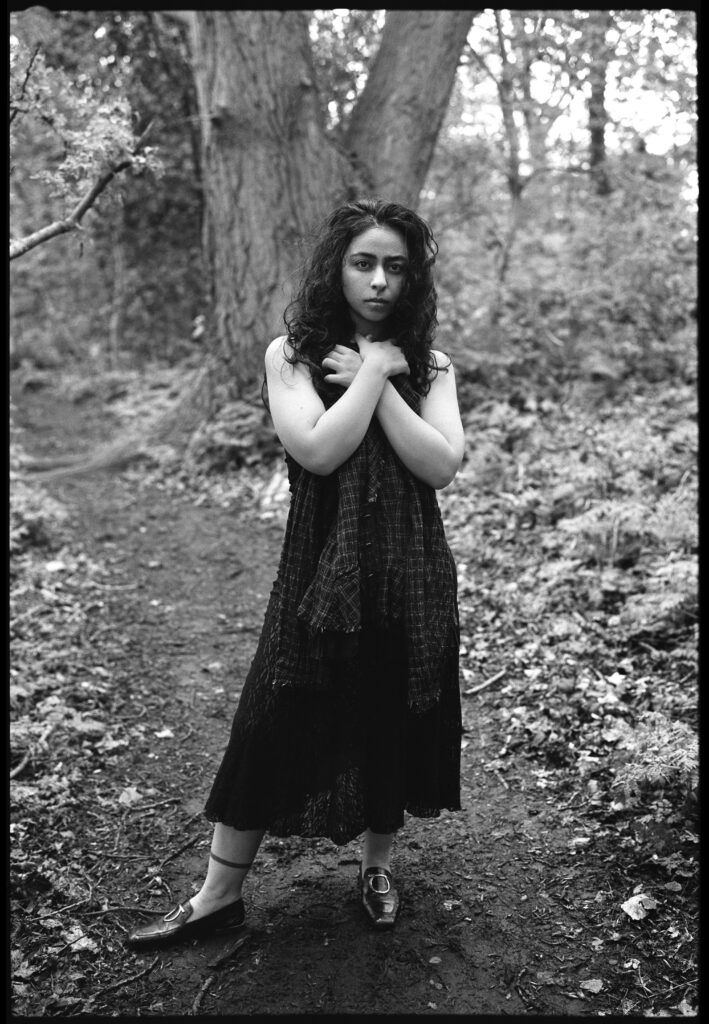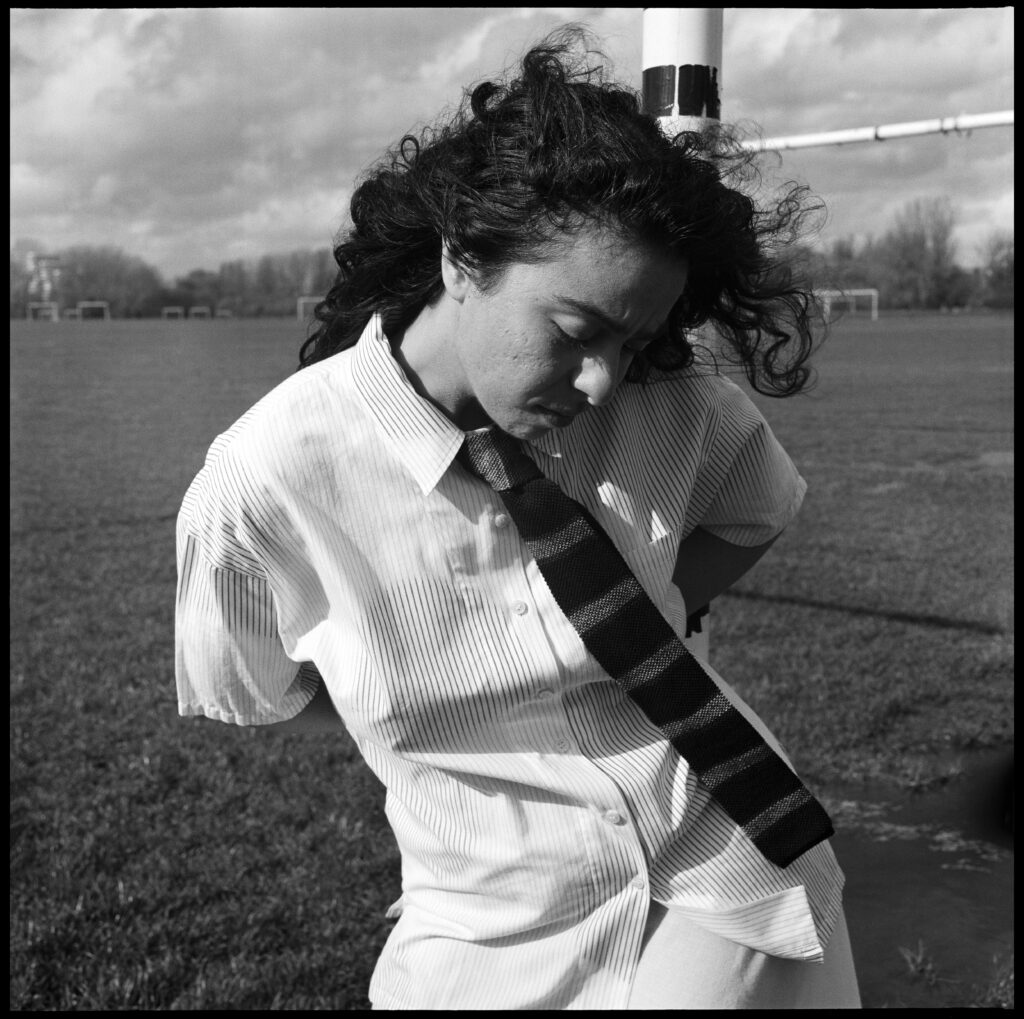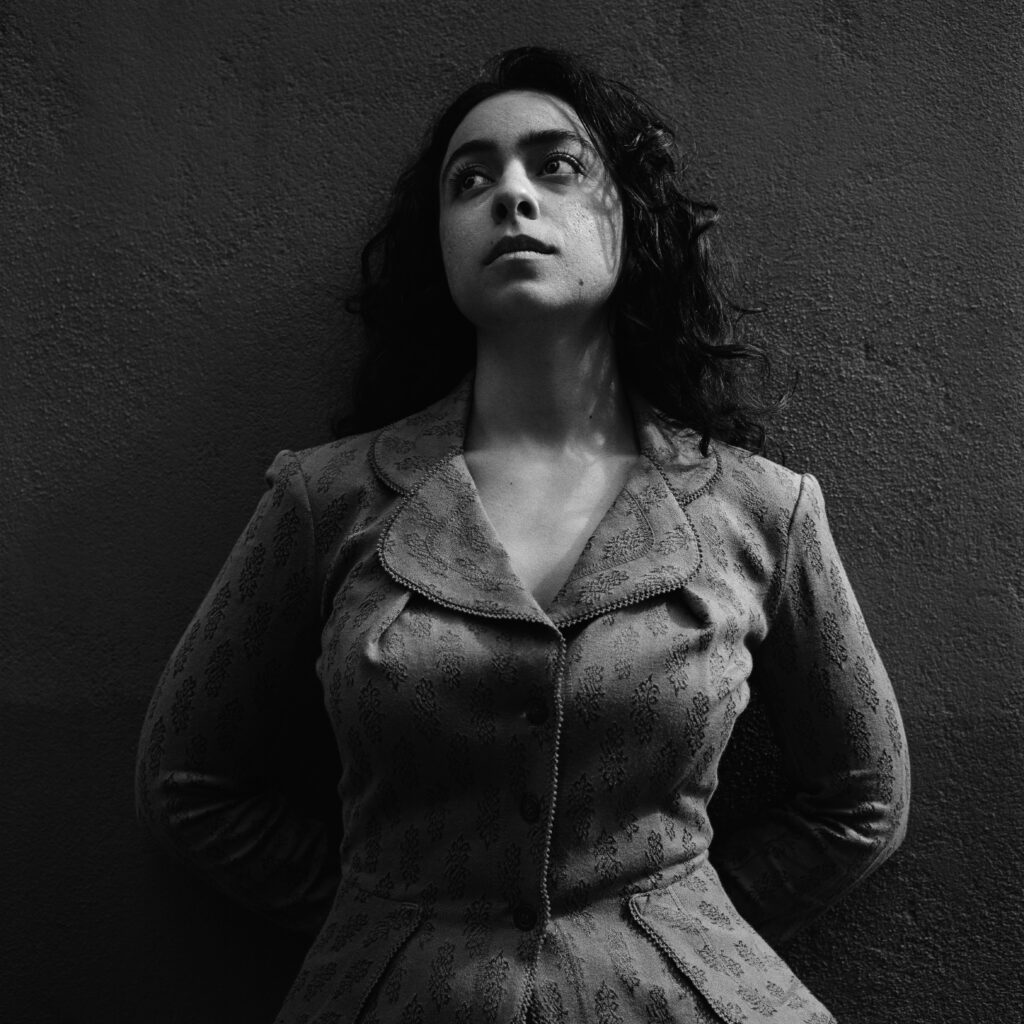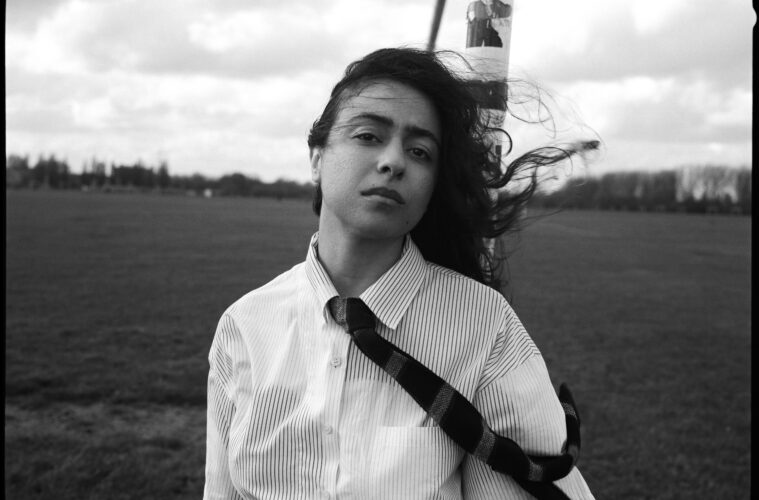Words by Sarah Risheq
Photography by Malak Kabbani
Styling by Youssef El Sayed
Hair & makeup by Imi Oztas
This feature is part of the “Frenquencies” issue
In her own words:
I use my voice (and some software) to project into the world. As a music and sound performer and researcher, I find it difficult to place myself politically in the current landscape of failure and helplessness around Palestine. But I also don’t want to pretend to be a singular voice amongst people who are extremely disheartened by the impotence of our political system and histories.
Bint Mbareh
I’d like to learn more about the history of Palestine through its food and through its women who have been singing. I enjoy fermenting things, andI find that this type of history far more potent and sustained and sustainable than the histories that tell us about the glories and heroic friends of past political leaders.
Why do we sing? Why do we chant? Do our voices just travel through a void? Or, is there an impact, for example, in protests or when we demand freedom?
Sound travels when we gather to create echo and break the silence, as a medium. When we chant, I often think of the way that our sound molecules are dispersed into a void. You can take this as a metaphor, but chants also spotlight demands. Like rain summoning songs, they are of an invocation, a prayer, an ask. But both are connected to life, to living in dignity, for رزق/لقمة عيش.
Sitting with Palestinian sound artist and researcher, Bint Mbareh, these four sections explore how and what sound can teach us about relationality1, responsibility, freedom, and what it means to sound together.

“We’ve seen it in protests, that when we amplify using each other’s bodies, we make a sort of “third sound” that is neither yours nor mine. Subconsciously or underneath all our language, we are gathering to cross some border.”
Photographed by Malak Kabbani
To Gather
What do we gather for? Where do our voices go?
BINT MBAREH: It’s important to think about “meeting” in different ways. We meet to be silent. We meet to voice together. And, we use our voices to gather. When we voice and meet – let’s say, in the context of protest – a lot of what we’re doing is crossing borders in very material ways. There is the crossing of [geopolitical] borders [into Palestine], like from Jordan or Egypt, which, though we’ve seen minimal attempts of this, can be very impactful. There’s also crossing the border that separates my body from yours or from the next person’s.
The format of a wave, and specifically the sound wave, is an effective tool to understand the porousness between our bodies. I make sound, and you make sound, and that forms an aggregate. When we make sound together, it’s as if we’re speaking through a different medium. The medium – whatever the wave travels through – can be air or water or a piece of fabric, but it can also be other people’s bodies. We’ve seen it in protests, that when we amplify using each other’s bodies, we make a sort of “third sound” that is neither yours nor mine. Subconsciously or underneath all our language, we are gathering to cross some border.
The question is, then, Where are all our voices going? I don’t have a clear answer to this, but it seems like, just because it existed in a particular moment doesn’t mean it doesn’t also exist long after it. I mean, we’ve learned many of the quips we chant from previous protestors, showing that chanting together is informed by a history of chanting. As this fight continues, future generations will carry on using this “ephemerality” and “ungrasp-ability” of the collective voice.
RISHEQ: [Our chants] are also repetitive, like songs summoning rain. You can’t hold them, but they still live between us, and even if you don’t notice them, they’re still there.
When you spoke about the human body as a medium to continue this process, I thought of the body as an archive that exists between us rather than in a museum or book. I also thought of echoes; we keep this knowledge alive by sharing it with each other, and it moves the sound from one moment to another, to another. Each repetition sets the stage for the next.
Echo as a Necessity
Absence and Repetition

Photographed by Malak Kabbani
BINT MBAREH: When we make a sound, we are hearing ourselves through the material reverberations of the wave through the room or mountain or pool where it’s made. It’s also how we can hear each other. To the extent that we’re connecting with each other, we’re also connecting with a more-than-human world that allows the wave to echo or resonate.
This is where – when we go back to your question, where does the sound go? – it’s [sound] impacting the world in a physical way, whether it’s perceived or not. It’s reverberating in the trees, for example, and whatever listens to it or absorbs it also changes. We can think about ourselves in that way, also, that we are also what we hear. We need to be treating the world with that degree of respect that says, I hear you and you hear me, and if you want to be amplified, I want to be considered for that role.
RISHEQ: I also want to step back a bit, and ask how these echoes are made absent by injustice. What silences or dulls these sounds? You once told me that sounds are made absent by alienation, atomization, carceral states, ecosystem degradation, and obsolescence.
BINT MBAREH: We don’t have to look for these examples. We’re witnessing a genocide. I am thinking so much about echo because of the moment that we’re in. The easiest way for Israel to “absent” people – to remove their physical voice from public space – is by killing them, and they can do it without any real or imagined consequences, beyond erasing entire lives and worldviews and cosmologies. Putting people in prison is another way of making sure their opinions aren’t heard, even though we have seen examples of writing, such as prison literature, come out of Palestinian prisons over the last decades.
Echoing what we know these voices have said and could have said, using the vocabulary of the people who we know and love who have been killed. Building on that is a powerful way to play with echo. It’s like using echo as a friend and as a tool.
RISHEQ: And one way that sound or people’s voices are controlled or contained is by policing their bodies: where you can go, what streets you are allowed to travel, the checkpoint you must cross or move around, how long does it take you to get to the assembly point of where our voices gather, etc. They do this because they know we carry this power.

Photographed by Malak Kabbani
Silence and Broken Telephone
Do we produce silence, or is it inherently there? What is left in the silence?
BINT MBAREH: This is an absolutist thing to say, and I don’t believe it in all circumstances, but I don’t think there is a way to move through the world in silence without that being political.
A political silence that attempts to not even portray people as people is powerful. At this moment, when we are asking a western power to regard us as human and saying the number of victims (at least 30 or 40 thousand, at this point), we expect that number to have an impact. We want our lives to be treated as weighty, as important, as valuable as worlds, in themselves. I think it’s better to be silent than to say that [to be acknowledged as human] simultaneously, because I think there’s a silence born out of the power of an image. I would like to resist any voice – internal or external – that tells me “I am tiny” and “I can’t” and “I’m helpless.”
RISHEQ: As you were speaking, I was thinking of silence – in particular, during the ICJ hearings – and how people are speaking. But even before October 7, it’s been made clear to us that the UN or these organizational bodies that come in and say, oh, we will save you, or we are the protectors of human rights have and will never stop anything, at least in the context of Palestine. It’s like they’re playing broken telephone: they say one word and then the other person says something else, and then Israel comes up and says, “I’m mad about this…”
You see war on your screen, and you see children crying and losing so much, and you get disgusted with humanity. But then you see the ICJ hearing, and you think, this is dystopic. There’s a difference, at least, between disgust and dystopia.
BINT MBAREH: If the voice is being absenced [made absent] in Gaza, then it also needs to be absenced elsewhere. When this happens, the world as we know it stops, a bit. Because sound is difficult to grasp, because it can’t be contained as easily as detaining a human body or killing it, it’s an important tool.
I’ve also seen networks of people and writing emerge. Now, it’s the opposite of silencing that is happening. To me, the clarity of the moment is so big and irrepressible that it is productive.
I wish that this many babies didn’t have to die for us to make a network that says, “Free Palestine.” I’ll continue to say from the river to the sea.
“The tools that I have are all related to the voice and its power, the extreme capacity it has to change current realities, the extreme capacity it has to bring the rain and to challenge everything we know to be true about the world when we sound together.”

Photographed by Malak Kabbani
RISHEQ: So, who can produce silence? And who ends up listening?
BINT MBAREH: The intentions and reasons behind our silence are important. We’ve striked, as musicians, while there have been multiple legal hearings and speeches by international bodies of complicity. I don’t want to make it a binary between the silence we produce and the silence that exists for other reasons, but I do think it’s important to think about how we respect the dead with our silence. We can also produce sounds in the tradition of mourning and the lamentations we make, as Palestinians. And sometimes, the reason for our silence is that we’re also searching for a sound.
RISHEQ: Do you think silence is a sound, too? I love how you connected the silence to strikes – it was a powerful way to voice concern or demand.
BINT MBAREH: It’s because resonance sustains itself across time, through our flesh, through our bodies, that even being silent together is a way of resonating together. We are quite literally made of kinetic matter that’s constantly moving, and so it’s at a specific frequency that we need to find together. When we are silent, we’re also harmonizing together.
RISHEQ: So, to gather, resonate, and harmonize together isn’t as smooth as we’d like it to be. Sometimes these are the very moments where we feel like we have failed.
BINT MBAREH: I think we’re forced to think from failure right now. And, a lot of what I think has changed in the world is our understanding of our interconnectedness in a way that makes us [see how we are] complicit in genocide.

Photographed by Malak Kabbani
Mediums as Actions & Space
What can our complicities direct us towards?
RISHEQ: In the beginning we were talking about how when we gather and how our voices ask and demand. Here, we’re also saying in silence, when we are intentional about it and strategic, there’s also a voice that’s loud and also demanding. It’s demanding certain things and working towards a certain change. It’s a full circle.
I just want to appreciate that for a minute and go back to strategy as responsibility. What can our complicities direct us toward?
BINT MBAREH: This border I was talking about, which separates us and which we know through the voice, is not very real. Right now, this is put in neon colors in front of our faces saying, look, you are causing the death of this person, be it in your silence or in your sound.
This needs to and is spurring conversation about why our life is like this. So much of what we’re doing is also because so many of us have been moved to actions that, three or four months ago [before the genocide], would have been considered radical. Losing money, losing time, losing sleep, losing friends, losing housing, losing friends, as in people dying, people being killed by extremists or radicals or regular Israelis. And we’ve been moved to these radical points, and at the same time, we see that we have still not been able to stop a genocide.

Photographed by Malak Kabbani
If we’re keeping in mind how much people are losing and that we’re still unable to stop it, then we have to think about the role of strategy. Clearly, we aren’t able to target that point of pain that is so big or unsurpassable that it will stop the genocide. The responsibility of so many of us now is, at least partially, to contextualize and historicize the moment so we know what that strategic point is.
And if I’m fully honest, I’m not optimistic that there is an antidote to this helplessness. But what I have is, I think, a specific set of tools that I don’t want to ignore or marginalize. Just because my enemy is so strong and big and powerful, does not mean that I need to set aside all my tools and go cave alone. The tools that I have are all related to the voice and its power, the extreme capacity it has to change current realities, the extreme capacity it has to bring the rain and to challenge everything we know to be true about the world when we sound together.
Conclusion
These sound waves can be political. They tell a story of gathering, harmony, and disharmony. The sound waves tell us of histories of how our people gathered and for what. What was central in their world at that moment of history? It is this resonance that made these chants or conditions of imagining otherwise possible.
- “Relationality is a theory that underscores how social connectedness, through mechanisms of empathy, foster collective action in noncentralized modes of network governance.” From Wing Shan Kan and Raul P Lejano, “Relationality: The Role of Connectedness in the Social Ecology of Resilience,” in International Journal of Environmental Research and Public Health, 20, 5 (2023): 3865 Link. See also: Feminist Relational Theory. Link.

